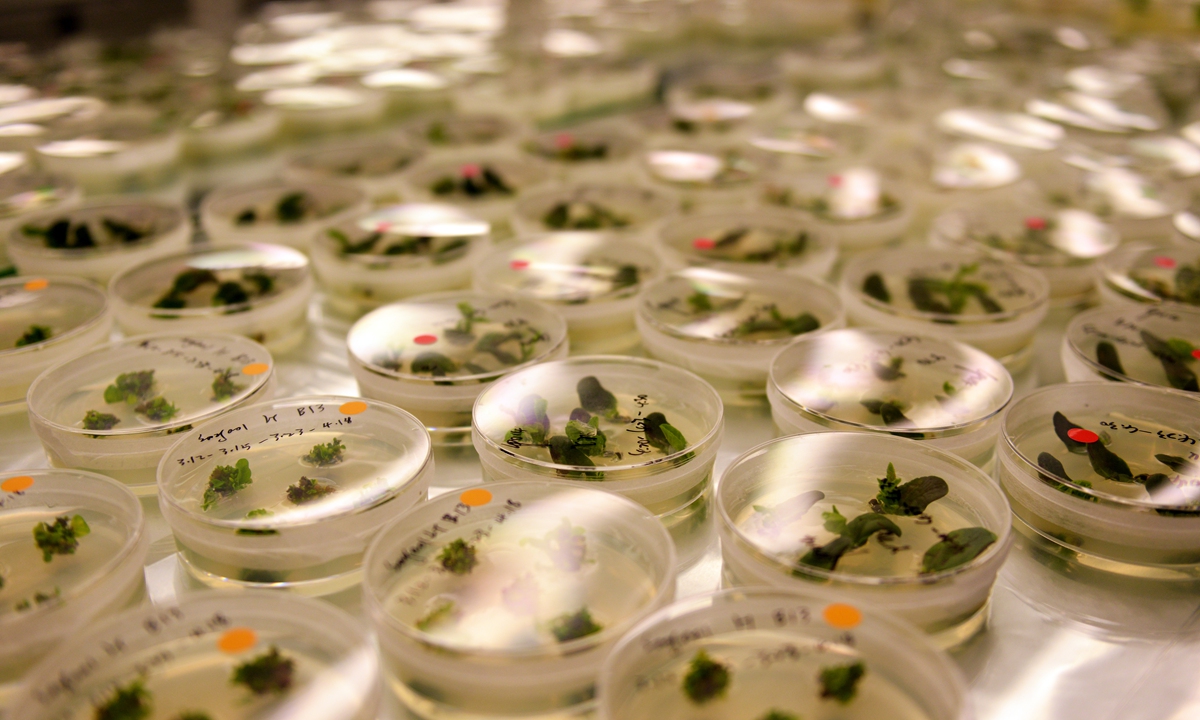[ad_1]

Soybean seeds undergoing genetic modification experiments in a lab at Longping Biotechnology (Hainan) Co in Sanya, South China’s Hainan Province. File Photograph: Zhao Juecheng/GT
Chinese agricultural experts and field leaders at a major forum on seeds in South China’s Hainan Province on Thursday referred to as for a lot more attempts to raise study and progress (R&D) in crop seeds to be certain food security.
The 2022 China Seed Congress and the Nanfan Agricultural Silicon Valley Discussion board kicked off in Sanya, Hainan, bringing with each other much more than 2,000 scientists, field staff and business associates to explore the troubles going through China’s seed market and options amid international meals cost hikes.
The discussion board will be challenge-oriented, concentrating on the defense and utilization of crop germplasm means, seed sector technological know-how innovation, seed market mental property safety and other subject areas. China’s seed breeding breakthrough is one particular of the focal factors of the forum.
The conflict between Russia and Ukraine, COVID-19 and severe climate have manufactured the domestic sector a lot more knowledgeable of the disaster of seeds, Wang Feng, principal scientist at the Rice Study Institute of the Guangdong Academy of Agricultural Sciences, instructed the World wide Instances.
“Even if there are no formulated countries strangling Chinese seeds, we can still come to feel that the external surroundings is forcing us to acquire the rice bowl in our personal fingers,” mentioned Wang.
Wang famous that the COVID-19 pandemic, Russia-Ukraine conflict and other factors have made world wide logistics intermittent. The deficiency of well timed accessibility to international marketplaces and severe climate circumstances in Europe and the US are impacting local food output and have lifted considerations about meals protection in different nations around the world.
“China imports soybeans and corn every single calendar year. To remove foodstuff security hazards, it is important to improve scientific and technological investment decision in China’s seed business,” Wang explained, introducing that seed firms and scientific analysis institutions should do nicely in R&D to make the restricted land extra successful.
“In a term, ‘good for farmers and fantastic for consumers’ is the way of our seed assortment,” Zhang Qin, Vice Chairman and Basic Manager of Anhui Quanyin Seed Business Technology Co Ltd, explained to the Global Instances.
Zhang stated that 90 percent of the seeds offered by Quanyin came from the firm’s personal R&D, and it expended 5 per cent of its once-a-year sales earnings on R&D, about 80 to 100 million yuan ($11.9-14.8 million).
Data from the business clearly show that in 2021, Quanyin bought additional than 100 million kilograms of seeds for several crops, which can create 60 billion kilograms of grain, enough to feed 100 million persons.
A staffer from Yuan Very long Ping Large-Tech Agriculture Co Ltd (Longping Significant-tech), a primary domestic seed enterprise, informed the World Periods that despite the fact that domestic seed providers have greater their R&D investment decision in the latest years, China’s countrywide seed sector is however modest in dimension, very low in concentration and lower in R&D investment decision.
In 2020, the revenue income of Longping High-tech was 3.3 billion yuan ($420 million), accounting for 5 p.c of the domestic seed market place with R&D financial commitment of 346 million yuan ($44 million). In the meantime, the revenue of Bayer, Germen seed company, was 62.1 billion yuan ($7.9 billion), accounting for a lot more than 20 p.c of the international seed industry. Bayer’s R&D financial commitment in agricultural small business arrived at 18.08 billion yuan ($2.3 billion), reported the staffer.
“China’s seed marketplace is fully various from intercontinental seed giants in terms of business scale and R&D financial investment,” the staffer noted.
As R&D is vital to the seed marketplace, Chinese seed corporations, in addition to the domestic sector, have been actively growing their R&D structure in overseas markets in the latest years.
For instance, Longping Superior-tech has designed extra than 50 breeding stations for rice, corn, veggies, millet and sunflower in China, Brazil, the US, Pakistan, the Philippines and other countries, with a whole region of 13,000 mu (866.7 hectares) of exam bases.
Jiang Sanqiao, deputy normal manager of Quanyin, told the International Occasions that the firm’s seeds are now exported to far more than 20 international locations and areas.
Due to the fact 2011, Quanyin has carried out countrywide agricultural technological know-how cooperation initiatives in Angola, Sierra Leone, Tanzania and other nations, and cultivated and crafted far more than 100,000 mu (6,666.7 hectares) of rice and corn farms abroad, in accordance to Jiang.
“The pandemic has also elevated consciousness on food stuff protection in countries in Southeast Asia and Africa,” Jiang mentioned, citing Bangladesh as an illustration, which has solved its own meals problem soon after China’s substantial-yield hybrid rice was launched in new many years.
The exact is accurate in the Philippines. Just after COVID-19, the planting space of Chinese hybrid rice has step by step increased in the Philippines. “In latest a long time, our company’s seed exports to the Philippines have been increasing at an once-a-year amount of 50 per cent,” explained Jiang.
[ad_2]
Source website link





More Stories
Common Mistakes To Avoid While Choosing Bolt Manufacturers
Computer and Technology Today
The Reasons Agriculture is Important